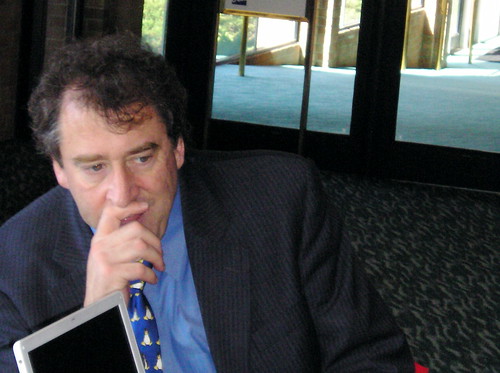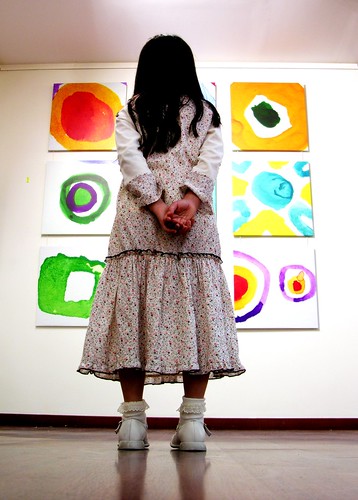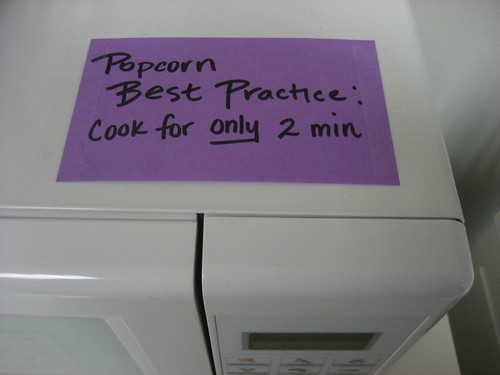Carlo Piana is an Information Technology lawyer and a Free Software advocate, as Counsel to the Free Software Foundation Europe he advocates the adoption of free/open source software and interoperable systems by European Public Administrations.
I asked Carlo, who I personally met about three years ago when we were both involved with the FSFE Italian chapter, to tell us more about his interest for free software and licensing issues.
How did you get involved with Free Software?
Well, that’s a long story. Here’s the short version. During late 90s I was using OS/2 as operating system of choice, but I did see no future for it, so I decided to switch to GNU/Linux as early as year 2000. It wasn’t easy, and some help was found in the local LUG. There I met Stefano Maffulli, Vice President of Free Software Foundation Europe.
Then the Commission decided that Microsoft was abusing the market, and I was wondering whether the FSFE was somewhat involved. Stefano said something like:
We are already an interested third party, now we need a lawyer with enough expertise to prepare our application with the Court. But time is really, really short.
I thought it was just a couple of hours’ work, just to file the application, then I was supposed to hand over the matter to another lawyer, so I said:
Well, I can help you with this initial step, then you will decide.
It turned out to be slightly underestimated, as now we are turning the third year of litigation, and still do not see the end of the tunnel. So far I have invested thousands of hours in the case, and am still counting.
In order to be effective in the case, I had to learn quick, and I became very interested also all aspects and implications of Free Software. I started helping people around with legal issues, and almost without realizing it, I was an active advocate. The media exposure of the Microsoft case was incredible, and perhaps this is the reason why people, including you, think I am important: because they know my name.
Let’s talk about the Case now.
Being involved in the Case somewhat changed my professional life, because I have never been in a litigation of that magnitude and importance. Even from a side seat, the pressure is enormous and ramifications are endless, the paperwork simply unmanageable. We now have gone through one interim case, and one merit case (we are awaiting the final decision), while one further appeal is on its way and we have applied also to that. The merit case was huge: thirteen judges, the hearing lasted five consecutive days, the “grand salle” was half packed just of lawyers and experts, the floor was barely enough for the two main parties, the rest was journalists, and it was not even enough. I said “side seat”, but don’t be mislead.
Our role has been central in many occasions, thanks to the incredible work that those who back me have done. People of FSFE, but especially the members of the SambaTeam, have been incredible, these guys really rock! Jeremy Allison at the interim and Andrew Tridgell (Trdige) at the main case were outstanding and really, really credible, but also who worked behind the scene, like Volker Lendecke or another Italian, Simo Sorce, were incredibly helpful.
But the case is way more than just that in court. The Commission is trying to firce Microsoft into compliance, after the first decision has not been suspended. But for the first time in history, there have been not just one, but two procedures for non compliance with the first decision: we are right now discussing the second one. The first ended by adding some hundred millions on the top of the at-the-time largest antitrust fine, somewhere short of half a million euro.
Meanwhile, the Commission is cooking another case with a broader scope.
While the first was on interoperability and lack of disclosure, as well as on the tying practice of bundling Windows Media Player with Windows XP, the second is about five different abuses in the server, client and application sector. In fact, interoperability is not just with network protocols, but also with the application layer protocols and formats.
And the market has not been idle either: the ineffectiveness so far of the remedies has allowed the monopolist to double its share in the server operating system market, now well above 70%, the share in the client OS market has not lowered and many more fields have the windows logo on it.
We are silently involved in that second investigation too. It not difficult to discover with whom because it is public on the Internet, but nobody still realized.
What do you think is going to happen in the next future?
The future is threefold. Free Software is gaining momentum by the day, over are the days when some people used to say that it was a toddler’s game. Most of the industry, from IBM to Google, from Sun to Oracle has various levels of engagement, and the mobile is the next frontier.
Software as a service is probably the next step, which could shift the paradigm, but we are still far from maturity. In the middle lies the world of proprietary software and media companies, which will be eventually made irrelevant by the first two, but now they are fighting back with market power, DRM, software patents and the most dangerous weapon: people not realizing how much freedom they are losing any day.
Antitrust is a good weapon to reestablish equanimity, but antitrust is also a political issue: just consider the number of monopolization cases in the USA in the last six years: 0. So we are at a turning point: public opinion must react now, and the first step is to convey more and more balanced information on these topic.
Thank you Carlo, and please keep us updated!
Technorati Tags: Free Software Foundation, Piana, Software Patent
 Bruce Perens by GeorgeNemeth
Bruce Perens by GeorgeNemeth
 Choose by
Choose by  Best Practices by
Best Practices by 
 Game Over by
Game Over by  FSFE Fellowship initiative by
FSFE Fellowship initiative by
Carlo Daffara 9:13 am on May 31, 2007 Permalink
Many thanks to Roberto for spreading the news on the event. I will be probably present some results from the OpenTTT matching model for open source software, and eventually to talk about business models; I would be happy if anyone would suggest additional topics of interest.
Roberto Galoppini 10:39 am on May 31, 2007 Permalink
Hi Carlo,
I enjoyed your idea to talk about OpenTTT, is a pragmatic approach to open source.
About business models – that I believe is a pretty interesting subject – to not be theoretical I will ask panelists to talk just about their actual business models.
Paolo Corti 7:01 pm on May 31, 2007 Permalink
Hi Roberto
I have definitely decided to be there the 9th, hopefully I will not have too much work that days…
Roberto Galoppini 7:11 pm on May 31, 2007 Permalink
Paolo I really hope not, it is on Saturday! 😉
Luca Sartoni 9:26 am on June 1, 2007 Permalink
I will be glad to take part at the event.
Paolo Corti 3:31 pm on June 1, 2007 Permalink
Oopss, I didn’t realize it is on Saturday. I definitely will be there 😉